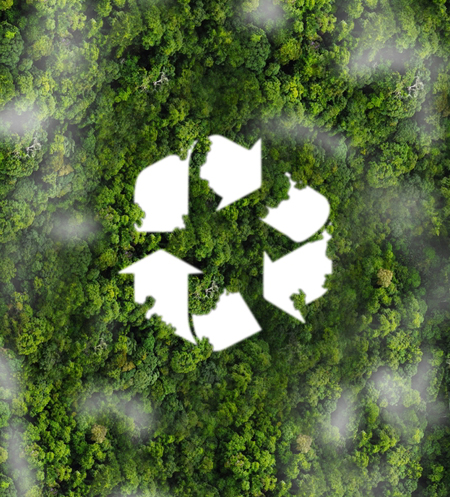Introduction
India produces millions of tonnes of waste each year, and with rapid urbanization, industrial development and change of consumption patterns, waste management has become an important environmental and public health challenge. The country produces more than 62 million tonnes of municipal fixed waste annually, indicating a sharp increase in decades of estimates. To solve this problem, a comprehensive approach related to new technologies, strong government policy and active participation from businesses, industries and citizens require. The future of waste management in India rests on stability, innovation and collaboration. Permanent waste management not only reduces environmental pollution, but also opens new paths for economic growth, employment generation and better public health.

Major challenges in waste management in India
Despite the increase in consciousness and efforts at different levels, India's waste management system is still struggling with the challenges of many systemic and infrastructures:
1. Lack of Proper Segregation
One of the basic problems is lacking waste of waste segregation at the source.Mixed waste - organic, recycled and dangerous components - treatment and recycling are difficult, disabled and expensive. In order to improve waste management in India, awareness campaign and compulsory insulation rules must be strengthened.
2. Inadequate Recycling Infrastructure
Most Indian cities lack sufficient infrastructure for waste collection, sorting, recycling, and safe disposal. Small towns and rural areas are especially under-equipped, leading to open dumping and burning. It is important to invest in strong waste management infrastructure for the future of waste management in India.
3. Growing Plastic and E-Waste Volumes
Plastic waste and e-waste have increased in recent years, with increasing consumption of packed goods and electronic devices. These waste sections require special treatment and disposal methods, which are still limited in India. In order to increase waste management in India, it is necessary to handle such hazardous waste in a responsible manner.
4. Unregulated Waste Disposal
A significant portion of the waste generated ends up in unregulated landfills or open dumpsites, posing serious health risks and environmental degradation.Little with landfill pollutes groundwater, and uncontrolled irritation contributes to air pollution. The strong enforcement of waste settlement laws will support permanent waste management in India.
5. Informal Sector Dominance
While the informal sector plays an important role in recycling, regulation with formal systems, lack of social security and integration often leads to unsafe work status and disabilities. Inclusion and support for informal waste workers is critical to improve waste management in India.
Innovative Solutions Shaping the Future of Waste Management in India
The future of waste management in India is being reshaped by innovation, policy shifts, and growing environmental consciousness. Here are some of the most promising trends and strategies:
1. Adoption of Smart Waste Management Technologies
Technology plays an important role in converting traditional waste management systems into smarter, more efficient and data -driven ecosystems:
Artificial intelligence and machine learning technologies enable automatic pruning, which improves the efficiency and purity of the recovered resources.
Sensors in bins provide real-time data at waste level, enabling customized collection roads and reduces operating costs.
Advanced analytics tools help municipalities and businesses track waste generation patterns, identify reduction opportunities, and improve service planning.
This innovation is important for modernizing waste management in India.
2. Expansion of Waste-to-Energy Projects
Waste to energy technologies is given traction as a permanent method of dealing with non-installation of waste:
Electricity Generation
Incineration of non-recyclable dry waste in controlled environments helps generate power while reducing landfill pressure.
Biogas Plants
Organic waste from households, food processing units, and agriculture is converted into biogas and organic manure.
Advanced Thermal Technologies
Gasification and pyrolysis are emerging as clean alternatives with lower environmental impact.
Expanding WTE is a promising component of integrated waste management in India.
3. Recycling and Strengthening of Circular Economy
India remains adapting a circular economy, in which garbage is continually rebuilt & looked at as a resource:
- Investment in recycling functions: Increased financing and incentives promote installation of plastic, metal and waste facilities across the country.
- Public-Private Partnerships (PPPs): Collaborations between municipalities and private players are improving waste collection and recycling efficiencies.
- Awareness and Education Campaigns: Programs that promote source insulation, fertilizer and low plastic use gain popularity, especially between youth and urban communities.
These initiators are important for promoting Waste Management Responsible in India.
4. Strict rules and implementation of policies
Financial responsibility in the waste industry has taken place, along with initiatives from the government and revised policies:
- Extended Producer Responsibility (EPR): This is responsible for lawyers responsible for the final consumer phase of their products, especially in the electronics and plastic industry.
- Swachh Bharat Mission 2.0: The second phase of this major mission emphasizes scientific waste treatment and urban -wide hygiene.
- State and Local-Level Regulations:Punishment for illegal dumping, prohibition of disposable plastic and compulsory waste separation criteria is used stricter.
Robust policies and enforcement will define the future of waste management in India.
The Role of Businesses in Shaping the Future
Business and industry are important for building a permanent waste ecosystem in India. Companies such as Bidya Waste Recycling Private. Limited is in advance and offers special waste management and recycling services that suit the needs of modern industries. Businesses can contribute significantly by:
-
Partnering with Certified Waste Recyclers:
Collaboration with authorized agencies ensures compliance with environmental rules and proper settlement practices.
-
Implementing Waste Minimization Strategies:
Reduce waste production at the source, using environmentally friendly packaging and using green production practices.
-
Investing in Innovation:
Supportive projects that work with start-up and innovations of waste-to-source, such as biodegradable alternatives and apocalythmen technologies.
-
Corporate Social Responsibility (CSR) Programs:
Being involved in waste management initiatives as part of the CSR can improve the brand and societal effect brand.
These efforts are essential for advancing sustainable waste management in India.
Case Study:
Bidya Waste recovery PVT. Ltd. Have emerged as a reliable leader in the Indian waste management industry. With expertise in handling complex waste currents such as expired food, cosmetic waste, industrial plastic waste and waste, the company provides end-to-end solutions for companies with a view to managing the waste in a responsible manner. Their services include:
- Safe and compliant collection and transportation of hazardous and non-hazardous waste.
- Advanced recycling and resource recovery processes.
- Tailored waste management plans for manufacturing units, retail outlets, and FMCG companies.
- Stability advice to help companies match environmental goals.
Bidya waste is recycled not only for its technical abilities, but also for its commitment to environmental management and innovation. Their services contribute significantly to improving waste management in India in industries.
The Path Ahead:
Opportunities and recommendations to ensure a permanent future, India must focus:
- Enhancing Waste Literacy: Introducing waste management education in schools and communities to foster long-term behavioral change.
- Scaling Composting Initiatives: Promoting decentralized fertilizer for organic waste can reduce the landfill burden and improve soil health.
- Incentivizing Innovation: Financial and policy assistance for new waste management technologies and professional models.
- Empowering the Informal Sector: Integrating informal waste pickers into formal systems with better safety, wages, and recognition.
- Promoting Research: Academic institutions and think tanks should be encouraged to conduct research and pilot studies on sustainable waste management in India.
Conclusion
The future of waste management in India lies in collective action – where government agencies, business and residents work together to create a cleaner, more sustainable environment. Through smart technologies, political reforms, circular economics practice and responsible trade management, India can address its increasing waste crisis and unlock major organic and economic benefits.
Prior to this change, companies such as the Bidya Waste Recycling Private recycle. Limited demonstrates how innovative and moral waste management can be a powerful strength for change. Their continuous efforts emphasize the importance of professional services in building a futuristic waste management system in India.
Now it's time to shop. Work together to create a green, cleaner and waste -free India.
The major challenges in waste management in India include improper waste segregation, limited recycling infrastructure, increasing plastic and e-waste, and unregulated landfill dumping. Addressing these challenges requires innovative technologies, strict regulations, and active public participation.
Technology is revolutionizing waste management in India through AI-powered waste sorting, IoT-enabled smart bins, data-driven monitoring, and waste-to-energy projects. These innovations are making waste collection more efficient and promoting sustainable recycling practices across the country.



